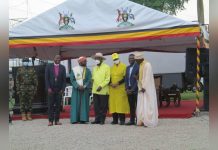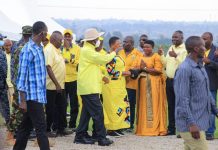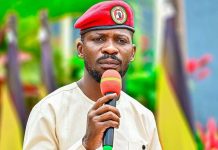Reported by
Faridah N Kulumba
Africa-Press – Uganda. The United States embassy spokesperson in Uganda Mr Anthony Kujawa while explaining the reason to why U.S did not mention the names of the affected officials said, they cannot provide the names because visa records are confidential.
“With these restrictions, we are sending a clear message that those who undermine democracy or human rights, along with their immediate family members, are not welcome in the United States,” he said.
Last week on Friday the United States imposed visa restrictions on some Ugandan government officials for what it called the undermining of the democratic process during the January 14th 2021 elections.
The visa ban was announced by the U.S secretary of state Antony Blinken on the Ugandan government officials, whose actions he said represented a continued downward trajectory for the country’s democracy and respect for human rights as recognized and protected by Uganda’s constitution. Blinken’s statement did not mention the names of the officials sanctioned nor did he formally inform Uganda about their decision.
The clue
Although Mr BLinken the U.S secretary of the state did not mention the names of the officials but he gave a clue by pointing out Ugandan security forces who were responsible for the deaths and injuries of dozens of innocent people, most especially the opposition supporters.
How can U.S visa restrictions affect Uganda?
The United States established diplomatic relations with Uganda in 1992, following Uganda’s formal Independence from the United Kingdom.
The U.S provides significant development and security assistance to Uganda, with a total assistance budget exceeding $970 million per year. According to the Bilateral Relations fact sheet Bureau of African Affairs, the human rights abuses of several Ugandan governments strained U.S relations with Uganda.
Ghanaian diplomat in Riyadh Mr Tahiru Iddrisu, told Africa-Press in a phone interview that when the diplomatic relations between the two countries start it involves the exchange of high level/official visits and economic or trade relations.
He added that the visa restriction on Ugandan government officials may affect Uganda in away that those who are sanctioned will not be able to represent Uganda in international conferences, there can be inability to access medical care or education, and they will not be able to transact any business in the U.S. “The relation is skewed in U.S’s favour, Uganda needs U.S more than U.S needs Uganda. That’s the harsh reality,” said Mr Tahiru.
Truth, shaken or guilt
The Ugandan government rejected the allegations and accused the United States of acting on lack of information, lack of knowledge and ignorance. “We are not going to lose sleep over this,” State minister for Foreign Affairs Okello Oryem told Reuters.
Speaking to Africa-Press the Uganda government spokesman Ofwono Opondo challenged the U.S’s decision saying the U.S did not have credible evidence against government officials. He described the U.S accusation as generalised collective guilt and collective punishment.
Uganda’s Opposition tears of joy
Main opposition figure in Uganda Robert Kyagulanyi alias Bobi Wine, welcomed the U.S’s imposition of sanctions on some government officials saying he hopped other countries will follow the U.S in sanctioning the alleged human rights violators in support of the Ugandan people’s quest for freedom reported Pindula.
He added that people of Uganda appreciate U.S Secretary of State Antony Blinken’s announcement of visa restrictions on Ugandan officials who interfered with the recent elections. The National Unity Platform party (NUP) whose members say they have been victims of human rights violations, welcomed the U.S decision.
Joel Ssenyonyi NUP spokesperson said that the party had identified 700 people it considered to be political prisoners in Uganda who were missing and that it would keep demanding their release.







I don’t think that these sanctions are going to have effects or have ever had effects on us in Uganda. It is just useless.